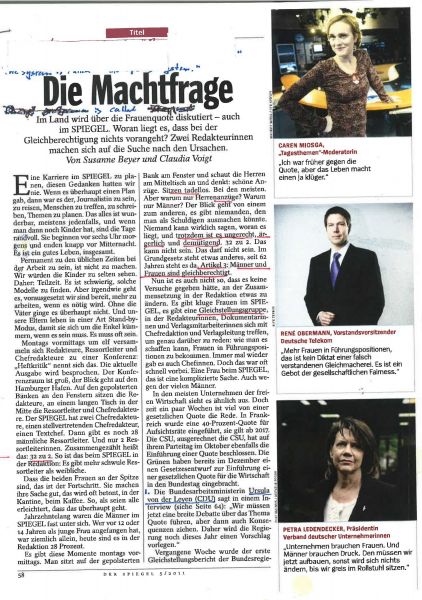A Question of Power: Feminism in Contemporary Germany
An eleven-page article titled "Die Machtfrage" (in English, "A Question of Power,") appeared in Der Spiegel, the German news-magazine, on January 31, 2011. The authors of the article, Susanne Beyer and Claudia Voigt, interviewed a dozen women who hold important positions in the German government, in German media, or serve in organizations. All of them have just one thing on their minds--hiring quotas to enable women to get positions on the board of directors of German corporations.
Beside boxed photos of themselves, the officials sum up their feelings about quotas in brief personal statements. They look well-dressed, if not chic, but reveal that they are not in a negotiating mood. Here are a few of their statements translated by me:
- Claudia Roth, Chairwoman of the German Green Party: "The opposition to hiring quotas is the last line of defense by the patriarchal leadership of the last century."
- Dorothee Bär, Spokeswoman for Women's Affairs, the Christian Democrat Party: "I do not see a solution without legislative action. Sometimes men have to be directed for their own good."
- Ursula von der Leyen, Defense Minister in the current government: "This concerns a quota for women to serve in board-member and executive positions. How the businesses accomplish this is up to them. . . . Sometimes, you have to light a fire under the men to make them act."
- Petra Ledendecker, from the Association of Women Entrepreneurs: "Business enterprises need women. Men need to be put under pressure to initiate it."
Ledendecker, on page one, wears an expression that says, "Don't even think of messing with me!" Her menacing face contrasts interestingly with the glossy attractiveness of Roth, Bär, and von der Leyen, like setting up a good-cop, bad-cop duality to facilitate negotiations.
I am curious to know how far the women are willing to push this issue: by making it a crime to deny applicants their choice of jobs? Will the courts institute punitive fines for transgressors, for instance? If women don't actually apply for the positions to fulfill the quota-requirements, will corporations need to employ talent-spotters to find suitable personnel?
I am impressed that none of these women are business-owners in their own right. Women who actually own their own business may not like the idea of a busy-body politician telling them whom they can employ. I am also impressed that the Feminists have so little sense of history.
All they have to do is look back at the history of Germany and the Nazi requirement that each business and organization in Germany have Nazi party members in key positions keep the organization in line. The Feminists should realize that members in key positions allowed the Nazi government to keep track of everything that a business or organization did, and to quell any dissent.
With its history of notoriously authoritarian governments, German men might accept the forceful tone of the Feminists' demands as their fate. The Feminists themselves do little to conceal their dictatorial intentions. They make quotas punitive or medicinal, rather than utilitarian.


